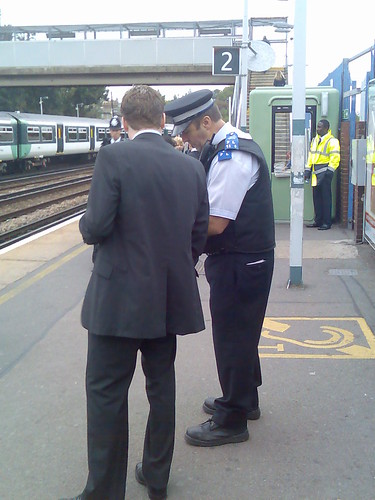 Image by engineroomblog
Image by engineroomblogThe European Court on Human Rights has ruled the arbitrary use of stop and search powers under Section 44 of the Terrorism Act 2000 illegal but for protesters who are regularly the victim of this law it may still be business as usual.
The judgement is indeed welcome and a blow to a government who have come under increasing pressure for their intrusion on civil liberties. Home Secretary Alan Johnson has expressed his disappointment and stated the government's intention to appeal. However, should the appeal fail and a law change occur this doesn't equate to an attitudinal change. For many police officers protesters are still considered a nuisance, despite protest being an essential part of democracy.
The Met in particular, who are the most frequent abusers of Section 44, are yet to issue any orders on curtailing searches. In a similar situation last summer the Met had to clarify for their troops a new law on photography in public places yet we continue to see photographers stopped and searched on an almost weekly basis. The European Court ruling is somewhat different, but the way photographers are treated despite advice from on high reveals the resentment from an increasingly authoritarian police force.
Beyond the use of stop and search laws is the issue of domestic extremism and a national database of protesters, which the Guardian highlighted in an investigation late last year. Anton Setchell, national co-ordinator of domestic extremism operations for ACPO, said of innocent people having their data stored: "Everyone who has got a criminal record did not have one once."
In a Dispatches documentary on the policing of protest Met Commander Bob Broadhurst showed his utter contempt for protesters in his unflinching support for such tactics as kettling peaceful demonstrations. In the words of blogger Copwatcher, Broadhurst displayed his "cluelessness and why he should never be left in charge of another public order situation".
The criminalisation and demonisation of protesters also creeps into government itself. Alan Johnson, the Home Secretary, laughed off the branding of "domestic extremists", saying: "If the police want to use that as a term, I certainly wouldn't fall to the floor clutching my box of Kleenex."
This repugnant attitude even transcends law and into media relations that border on psychological warfare. In the approach to the G20 the media was awash with statements from the police about an impending "Summer of Rage", a police fabrication intended to deter peaceful protesters from taking to the streets. They even talked about the likelihood of rain to ward off the fair weather activists.
Let's not forget, this law is first and foremost about fighting terrorism (albeit an abstract and indefineable concept of terrorism). The climate of fear, perpetuated and amplified by those in power, is still tangible, even more so following the failed airline attack on Christmas Day. The likelihood of the government relaxing their stance on security is similar to that of a snowball passing through Dante's nine circles intact.
In this wider environment, while this attitude towards protest remains, the police and government will continue to stifle and intimidate through existing powers and who knows, even by creating new ones.



No comments:
Post a Comment